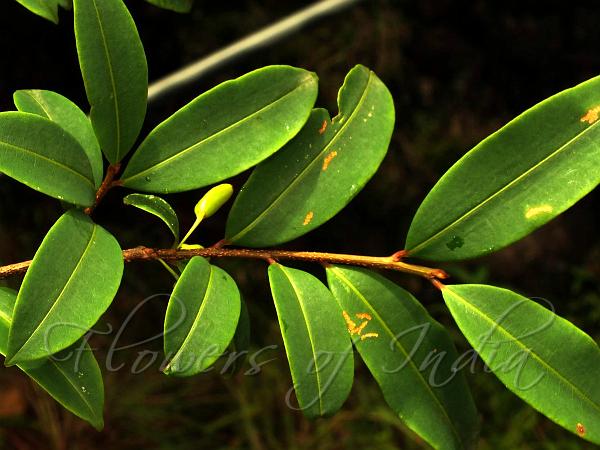|
| Chinese Coca |
|

|

| File size | 252238 |
| Original date | 6/24/17 11:19 AM |
| Resolution | 1200 x 900 |
| Flash | Flash fired |
| Focal length | 23.0mm |
| Exposure time | 1/149s |
| Aperture | 8.0 |
| Focus Distance | 0.0m |
| Metering Mode | Spot |
| Camera make | FUJIFILM |
| Camera model | FinePix HS35EXR |
| Sensor type | OneChipColorArea |
|
|
|
|
Photo: |
Botanical name: Erythroxylum sinense Family: Erythroxylaceae (Coca family)
Synonyms: Erythroxylum kunthianum, Sethia kunthiana
Synonyms: Erythroxylum kunthianum, Sethia kunthiana
Chinese Coca is a shrub or small tree, up to 8 m tall,
much branched; branchlets warty, young shoots reddish; bark
greyish-white, rough, thin; wood white, inside red with white streaks
which tum brown on exposure. Leaves are 1.8 - 7 x 0.8 - 2.6 cm,
oblong-lanceshaped, lanceshaped, elliptic-lanceshaped, rarely
elliptic-obovate, blunt at base, pointed or tapering, rarely blunt at
tip, entire, papery, opaque above, pale glaucous brown beneath, midrib
prominent, reddish, lateral nerves obscure; young leaves red;
leaf-stalks 1-5 mm long; stipules intrapetiolar, subulate, deeply bifid
with sawtoothed margin, persistent. Flowers are 2-5 mm long, white,
solitary, bisexual; flower-stalks 1.3 cm long, slender, thickened
upward. Sepals are 5, rarely 6, free, 1.2 x 3 mm persistent. Petals are
5, 1-2 mm long, elliptic-oblong with a bifid, white strap-shaped
appendage near base. Stamens 10, rarely 14, unequal, usually
alternately short, staminal tube less than 1 mm long, slender; anthers
basifixed, dehiscence longitudinal. Ovary 1 mm long, 3-loculed; styles
3, short, free from base. Drupes are red, 10-14 x 3.5 - 4 mm,
oblong-curved, blunt, subtrigonous, shining, with persistent calyx.
The bark is reported to be used for chewing with 'Pan'. The wood is
light brown, hard and takes a beautiful polish. Chinese Coca is a
common undergrowth in evergreen forests up to 1520 m in Meghalaya.
Bangladesh and Myanmar. Flowering: March-June.
| Identification credit: K.L. Chaudhary | Photographed in Cherrapunji, Meghalaya. |
• Is this flower misidentified? If yes,